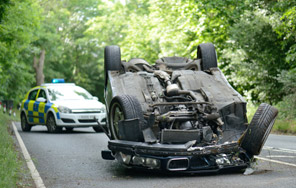 Rollovers represent a small fraction of the accidents on our roads, yet they have one of the highest fatality rates. The reason is that the occupants, as well as objects within the vehicle, are thrown about. In addition, passenger ejections can happen, which are often lethal. Because of the serious nature of the rollover, driver awareness is important regardless of the type of vehicle they drive.
Rollovers represent a small fraction of the accidents on our roads, yet they have one of the highest fatality rates. The reason is that the occupants, as well as objects within the vehicle, are thrown about. In addition, passenger ejections can happen, which are often lethal. Because of the serious nature of the rollover, driver awareness is important regardless of the type of vehicle they drive.
Vehicles Most Prone to Rollovers
No vehicle type is completely immune to rollovers. However, minivans, SUVs and pickups have a greater susceptibility to this type of accident. All of these vehicle types have a high center of gravity compared to the horizontal distance between the two front wheels (or back wheels). In summary, tall and narrow vehicle types are more prone to a rollover than the short and squat vehicle.
Types of Rollovers
Rollovers are classified as either tripped or untripped. Tripped means that an external obstruction such as a curb, large pot hole or soft shoulder initiated the rollover. This happens during cornering, swerving or skidding when the wheel catches on the obstruction that "trips" the vehicle. Tripped rollovers are more common and happen to all types of vehicles including sedans.
Untripped rollovers occur on flat road surfaces where no road obstructions are encountered. This can happen from over-correction maneuvers done at high speeds. A violent swerve to avoid an accident or to correct fish tailing are common ways that this occurs. Tire blowouts also cause untripped rollovers.
Rollover Avoidance Tips
- Only use the recommended tires for your vehicle. A tire that grips too much can bring an SUV very close to rolling over on hard turns, while one that slips too much on turns causes the SUV to lose control.
- Don't make your SUV or minivan more top-heavy by loading very heavy cargo on its top. Carry heavy loads spread out inside the vehicle.
- Keep all of your tires properly inflated. Soft tires make your vehicle less stable on turns. When tires on one side are significantly softer than tires on the other side of your vehicle, a rollover is more likely to occur.
- Keep your speed down, especially on turns. Cornering at the limit of your vehicle means that it is primed for a trip rollover. If you hit a pothole or slide on to a soft shoulder because of a slippery spot, a rollover may ensue.
- Allow plenty of road space ahead of you. Lots of road space between you and the car in front means you won't have to make hard maneuvers to avoid a traffic hazard.
Rollovers are among the worst types of accidents. In addition to their potential for severe injury, the damage they do to your vehicle is usually very extensive. They often involve structural damage to the frame, which is one of the most expensive things to repair. The size of the claim and the accident's severity are major factors that affect your premium.
If the rollover is a single vehicle accident, then there's a good chance you will be found at fault unless it's the result of a manufacturing defect. This may also increase your rates. It only makes sense to follow the above tips and avoid serious injury, damage to your vehicle and higher auto insurance premiums.
Get a quote today. Call La Familia Insurance at (888) 751-7511 for more information on Dallas auto insurance.